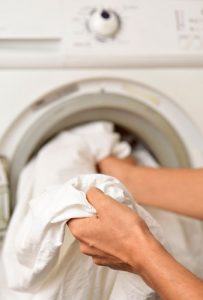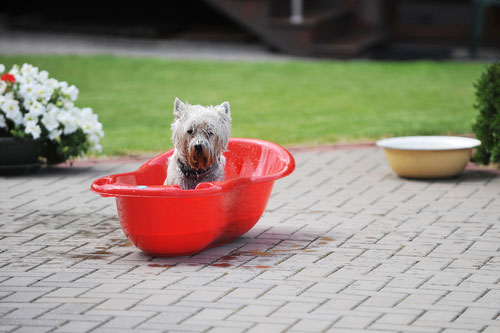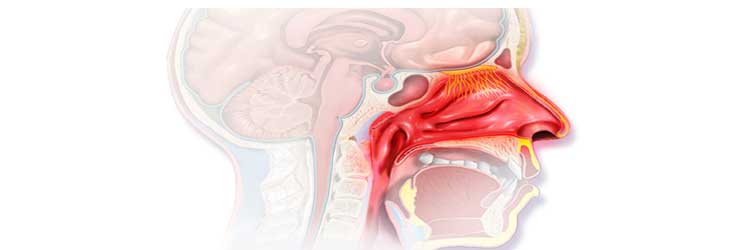Why do I Sneeze and have Runny Nose in the Morning?
9When you wake up in the morning, do you find that you have to blow your nose constantly for a good while?
Do you have to sneeze several times before you even get to drink your coffee?
Do you have itchy watery eyes?
Does the runny nose and sneezing disappear after a few hours?
If that sounds like you, I can certainly relate!These annoying allergy problems are exactly why I started this blog.
The good news is that there are very simple solutions for the morning allergy blues.
They helped me, and they can help you, too! What can you do? Read on to find out!
Contents
What Causes a Runny Nose, Watery eyes and Sneezing in the Morning?
There are two possible causes for morning allergy symptoms:
Cause #1: Allergic Rhinitis: This was the culprit of my runny nose, watery eyes, and sneezing in the morning. This allergy problem is simple to tackle! Read on to learn how.
Cause #2: Nonallergic Rhinitis or Vasomotor Rhinitis: This is inflammation of the internal nasal membranes. We’ll talk more about this later.
One key to managing your allergies is to identify what you’re allergic to and to reduce your exposure to it.
There are four common allergy triggers:
- Dust mites – Dust mite feces trigger allergies. An old mattress can hold millions of dust mites and their fecal matter! Gross!
- Animal dander– Pet secretions trigger allergies.
- Mold
- Pollen
Pretty much everyone is exposed to these allergens on some level. But the good news is that you can control your exposure!
Before we begin discussing exposure control, let’s take a quick look at allergy types, symptoms, and diagnosis:
Cause #1. Allergic rhinitis
Although the name of this sounds like a rare tropical animal, it’s actually just your run-of-the-mill hay fever. If you suffer from allergic rhinitis, then the root of your problem is an over-enthusiastic immune system.
When you breathe in specific particles, your immune system goes into overdrive as a reaction! As a result, you get sneezing and watery eyes as your body’s attempt to repel the microscopic intruders.
You might also get other problems related to your allergies, such as ear infections and sinusitis.
The particles that cause this reaction are allergens. Common allergens include dust, dust mites feces, fumes, mold, animal dander, and pollen.
The bad news is that you might be stuck with your allergies, but the good news is that once you identify allergens, you can control them.
Not sure what you’re allergic to? No worries! Your allergist can do a prick test to identify which kind of allergens trigger your allergies.
In my case, the biggest trigger was dust and dust mites feces, which are a common trigger for both allergies and asthma.
Later in this article, I am going to share the three simple things I did to get rid of dust mite allergens.
Dust mites and their allergy-causing proteins, or feces, are found mostly in bedding such as pillows, and mattresses. Not sure if you have a dust mite problem? You can do these tests to check whether or not you have dust mites.
Maybe you have allergies throughout the year. Or, perhaps you suffer from seasonal allergies that emerge in the fall before the first hard frost.
Dust mite population increases when humidity increases, so depending on where you live and the severity of your allergies, you might only notice them at certain times.
Cause #2. Nonallergic rhinitis or Vasomotor Rhinitis
Nonallergic rhinitis is an inflammation of the internal nasal membranes. Although allergies can cause nasal inflammation, sometimes there is no specific cause for it.
In vasomotor rhinitis, the blood vessels inside the nose dilate, which causes swelling and perhaps congestion. You might even get annoying mucus issues, including a runny or stuffy nose and a postnasal drip.
Although an inflamed, stuffy nose is typical with vasomotor rhinitis, you will not typically have an itchy nose, itchy or watery eyes, or a scratchy throat.
These symptoms are typically due to an allergy, which we talked about in the first section of this article.
Changes in the weather, viral infections, spicy or hot foods, and medications like ibuprofen and aspirin may also cause this condition.
Migraine headaches, a foreign object in your nose, or polyps can also cause a runny nose in some cases.
Many other conditions like a deviated septum, the common cold, chronic sinusitis, pregnancy, and Churg-Strauss syndrome could also be the culprit. Consider all the factors in your environment before self-diagnosing.
Not Sure What You’re Allergic To?
If you’re not certain that your runny nose in the morning is caused by allergies, visit your doctor.
Even if you are certain that you have allergies, a visit with your doctor can help you identify exactly what is causing your allergies and what you can do about it. This can save you a lot of wasted time, money, and effort!
If you’re pregnant, breastfeeding, or are an older adult, or if you have a child with allergies, make sure you talk to your doctor before you try over-the-counter medication to reduce your allergy symptoms.
This is especially important if you have asthma or another health problem.
Schedule an appointment with your doctor to discuss your suspected allergy problems. He or she can refer you to an allergist, who will be able to test you for common allergens.
Before you go to the appointment, take note of your particular symptoms, when you have them, and what seems to make them worse.
When you visit the allergist, he or she can administer tests. You may have to do a skin test to see what you’re allergic to.
Your allergist will put small amounts of various allergens on your skin to test your reaction. You may also do lab tests that look for markers that increase your risk of allergies.
Your allergist or general doctor may prescribe allergy medications to easy your symptoms. Some people recommend taking the allergy medication before bed. This may decrease your morning allergy attacks.
If your allergies are particularly severe, you might benefit from immunotherapy. This includes allergy shots, but to participate in immunotherapy, you will need to know what, specifically, you are allergic to.
While the allergist may prescribe medications for your allergies, there are some easy ways you can reduce your allergies without drugs. Here are three ways to reduce allergens:
How to Prevent Sneezing and Runny Nose in the Morning – 3 Things to Do Today!
Do you have a long chain of sneezes in the morning, or regular morning sneezes? This could be an allergy symptom.
Do you have mucus in your throat? This is a postnasal drip, and it can get yellow and nasty if you end up with a sinus infection. This can also be a sign of allergies.
Are your eyes may also be itchy and watery, and do your ears, nose, and throat feel itchy?
If you answered yes to all of these questions, then you should try the following three tricks to reduce morning allergies:
#1: Thorough Cleaning of your bedding

Thoroughly cleaning your bedding is the first thing you can do to reduce your morning allergies. High concentrations of dust mites can be found in beds, where they have a constant supply of food, moisture, and warmth.
Dust mites are tiny creatures invisible to the naked human eyes. You can’t see them, but they are there! Dust mites like to cuddle in your bed because their food source is your dead skin cells!
According to research, we shed around 0.001 to 0.003 ounces of skin flakes every hour. Those cells stay in your bed, providing the perfect snack for dust mites.
Dust mites can live in dry climates, but they tend to increase in number during humid periods where they can suck water from the atmosphere. No wonder high cases of allergies happen in high humidity.
To reduce the number of dust mites in your bed, you need to properly clean your bedding.
Here are the cleaning steps to take:
- Clean ALL your bedding with warm water. It’s best to use this special detergent to make sure all dust mites on your bedding are dead. Learn more about Dust mite laundry detergent and additive.
- Clean the floor. If possible, get rid of carpets, especially bedroom rugs. If you have hard floors, mop the floor. Learn more about steam cleaners.
- Vacuum things you can’t possibly mop or clean, such as upholstery. Learn more about dust mite vacuum cleaners.
#2: Cover your pillow and mattress with special dust mite resistant cover
Now that your bedding is clean, the allergy triggers which were lingering on your bedding are gone. But this is still not enough!
What about dust mites hiding in your pillows and mattress? What about their feces buried deep inside? You can’t cram a mattress into your washing machine.
An old mattress can hold millions of dust mites and their fecal matter!
There is a simple and cheap solution to preventing these gross-looking pests and their nasty poop. A dust mite resistant mattress protector and some pillow covers can keep mites from burrowing in your bed.
These covers will also prevent the dust mites feces already present in your mattress and pillows to get to you. Plus, they also they will cut the supply of food – your dead skin cells- which will cause dust mites to die and stop reproducing.
If you are not on a tight budget, you can get rid of your mattress and pillows altogether and purchase dust mite resistant mattresses and pillows. Learn more about dust mite resistant mattresses and pillows.
#3: Bathe your pets

Pet dander is another common trigger for allergies.
If you have pets, avoid sleeping with them in the same room.
Bathe your pets with this special pet dander removal shampoo to make sure they are free of pet dander. Learn more about pet dander removal shampoos.
In Conclusion
While there is no cure for allergies, avoiding what causes your allergies is one way to significantly reduce your symptoms.
Clean your house often to rid it of allergens like dust, animal dander, and mold. You should see a quick improvement in your morning allergy problems!
Let me know your feedback in the comment box below. Did my suggestions help you?




